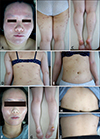Dear Editor:
A 20-year-old female patient had atopic dermatitis (AD) from her second year. She had been treated with antihistamine, and with topical steroid and calcineurin inhibitor, for about one year. Four months ago, her symptoms got worse. At first visit, her body mass index (BMI) was 26.81 kg/cm2 (73 kg, 165 cm), waist circumstance was 82 cm, Eczema Area and Severity Index (EASI) score was 16.8, and visual analogue scale (VAS) for pruritus was ‘7’. Physical examination revealed diffuse erythematous patches and maculopapules with slight crust and scales over her whole body, especially her face, back, and posterior aspects of her thighs (Fig. 1A~E). Symptoms did not improve after cyclosporine (100 mg/d) was given for three weeks. Maintaining existing therapy, she was referred to Family Medicine to manage her obesity. Dietary control and exercise were prescribed. Aerobic exercise of moderate intensity (METs 6~7) was recommended 150 minutes/week. She recorded the quantity, type of exercise, and total daily calorie intake in a diary. One tablet of antiobestic drug lorcaserin (10 mg) twice/day was prescribed. After 12 weeks, her BMI was 20.64 kg/cm2 (56.2 kg), waist circumstance was 65 cm, and symptoms had improved. EASI score was 6.6, VAS was ‘4’, and skin lesions improved (Fig. 1F~I). We received the patient's consent form about publishing all photographic materials. Currently, improved symptoms are maintained only by applying evening primrose oil and tacrolimus ointment. There were no significant differences in eosinophil counts and total immunoglobulin E after 12 weeks (Table 1).
Positive studies regarding the association of obesity and AD in children and adults has been reported1. Some studies (including Korean ones) reported that the risk of AD was correlated with increased BMI predominantly in women, especially prepuberal23. The associative mechanism of obesity with AD remains unknown, but some have been proposed. Polymorphisms of β2-adrenergic (ADRB2) and glucocorticoid (NR3C1) receptor genes, and fractalkine receptor gene CX3CR1 in asthma, atopy, and obesity could explain a positive relationship between them. Moreover, obesity could affect the immune system via adipokines (e.g., adiponectin and leptin)4. Adiponectin has anti-inflammatory effect, but leptin has proinflammatory effect, regulating cytokines, circulating monocytes, natural killer cells, and the polarization of CD4+ and CD8+ T cells4. Reduced adiponectin caused inflammation with increased eosinophils and influenced the occurring allergic march4. Obesity could also influence sex hormones25. Increased estrogen stimulated interleukin (IL)-3 and IL-4 in monocytes and promoted a Th2 phenotype immune response2.
In a previous study, patients showed significantly higher EASI scores at BMI≥25 kg/cm2 than at BMI<25 kg/cm2 (only in pre-adult-onset adult AD)3. These results suggest the severity of AD is associated with obesity although causality is unknown. Some studies reported obese patients with psoriasis improved after weight loss. However, in the field of AD, studies on the effect of weight loss are limited. Our case suggests weight loss could improve the symptoms and status of AD. Further randomized studies with a large number of patients are warranted to confirm the significant relation between obesity and AD.
Figures and Tables
Fig. 1
A 20-year-old female patient with atopic dermatitis presents diffuse erythematous maculopapular patches with crust and scales. (A) Face, (B) post aspect of thighs, (C) post aspect of lower legs, (D) abdomen, (E) back. After 12 weeks of treatment, skin lesions improved. (F) Face, (G) posterior aspect of lower leg, (H) abdomen, (I) back. We received the patient's consent form about publishing all photographic materials.

Table 1
Changes in severity of atopic dermatitis (EASI), VAS, BMI, waist circumstance and laboratory findings during 12 weeks of weight loss

ACKNOWLEDGMENT
This study was supported by grants of the National Research Foundation of Korea (NRF), funded by the Ministry of Science, ICT & Future Planning (NRF-2017R1A2B4006252), Korea Healthcare technology R&D project, funded by Ministry of Health & Welfare, Republic of Korea (HI17C0597), and the Hallym University Research Fund (HURF-2017-35).
References
1. Silverberg JI, Silverberg NB, Lee-Wong M. Association between atopic dermatitis and obesity in adulthood. Br J Dermatol. 2012; 166:498–504.

2. Hancox RJ, Milne BJ, Poulton R, Taylor DR, Greene JM, McLachlan CR, et al. Sex differences in the relation between body mass index and asthma and atopy in a birth cohort. Am J Respir Crit Care Med. 2005; 171:440–445.

3. Son JH, Chung BY, Kim HO, Park CW. Clinical features of atopic dermatitis in adults are different according to onset. J Korean Med Sci. 2017; 32:1360–1366.





 PDF
PDF ePub
ePub Citation
Citation Print
Print



 XML Download
XML Download